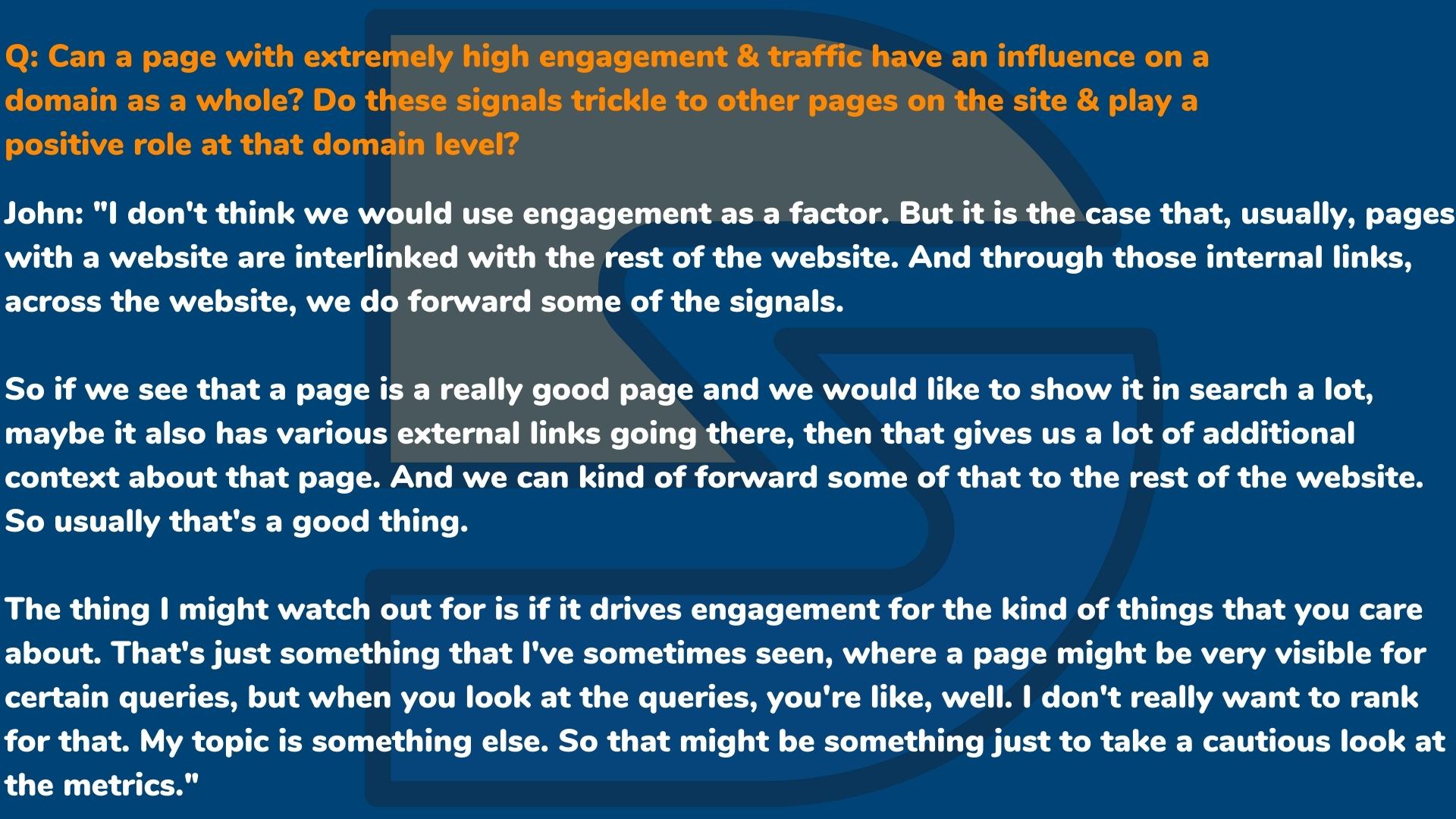Do you spend a lot of time creating “engaging content” for your blog? Are you told by SEO gurus that user engagement is the #1 on-page SEO ranking factor? If you answered yes, I have bad news for you.
User engagement is in no way related to SEO, at least not directly.
In this post, we will go through a lot of confusion that there is around user engagement SEO & check out some best practices to utilize user engagement in our favor.
Is user engagement a ranking factor?
In an office hour conducted by Google Search Central on YouTube, a user asked this question to John Mueller, who’s a search advocate at Google.

The conversation ended, but let us dig deeper & find evidence if it’s otherwise. Shall we?
What are the types of user engagement that matter for SEO?
John said that user engagement is not a factor, but on-page SEO is all about what the user does on the page. So does that mean that John disqualified on-page metrics?
Absolutely no!
All the on-page SEO metrics are taken into consideration indirectly. If someone is spending a lot of time on your page, (high on-page session time & low bounce rates) this signals to Google that people are finding the page useful.
But high on-page session time is also sometimes misleading. We all have several tabs open, do we read all at once? Nope. I don’t.
So what are the factors you should be worrying about? Let’s have a look at SEO factors that you shouldn’t miss tracking.
#1 URL Optimization:
URL is where all the SEO stuff begins. The crawler follows links from one page to another & the URL is the first thing it notices. That’s the entry point of any crawler.
Over-optimize & you lose half the battle.
Keep the URL just enough for users to understand what’s on the page. The URL will tell people if they should click the link or not. Stuffing keywords doesn’t help anymore. Focus on giving the context of the page. 9 out of 10 times, context will target the right keywords than your “keyword research” ever will.
#2 Meta tags:
I don’t mean meta keywords. Major search engines like Google have stopped relying on meta keywords for ages now.
Meta tags are how you describe the page to a search engine first & then the user. I say search engines first because the crawler will go through the meta tags first, save a copy in the index & show for relevant keywords.
Check out how search engines work to get a detailed view & understand the importance of meta tags.
#3 Keyword research
I’m not a big fan of finding keyword research before writing the post. I leave that to search engines (& webmaster tools) to suggest the keywords that my pages have the best chances to rank.
However, if you don’t but this idea & if you’re insecure that you’d need keyword research beforehand, here’s how I’d ideally do keyword research:
- Pick the central topic your page is targeting, it has to strictly be just one
- See what are the searches being made around that topic
- Checkout the conversations people are having on social media
- Collect the list of questions/searches you find on “People also ask” & “Related searches”
- Create a chronological outline of the questions you’ve found
- Create a post with internal links to & from the post
These steps will lay a very strong foundation for on-page SEO.
#4 Optimizing content
I skip the keyword research & come to this step once I publish the post (& it starts indexing)
Technically, this is my keyword research.
Once my page starts indexing, I dig into the Google search console & see the keywords my page is getting impressions for. Optimize my page for the keywords, I think I wouldn’t find otherwise.
The fact that SEO is not a one-time job, proves itself to be true here. If it was, what was the need to continuously optimize a page for years in order to stay on the top (or at least be eligible for #1 rank)?
#5 Number of words
It almost became an unwritten rule in SEO space that the longer the content, the higher the chances of ranking at the top. Even studies showed that to be true.
I have a theory.
The number of words matters only if you’re running a printing press. Otherwise, I really don’t think the number of words makes any difference. I know, everybody can’t be Seth Godin. But speaking of numbers, I’d never agree with the fact that more number of words means more chances of ranking at the top.
You can’t write garbage & expect to rank #1 in hallucination. However, when you find an article that is lengthy & is ranking #1 for the target keyword, perform a biopsy. You’ll find that the number of words was never a motivation. It covered the lengths & breadths of the topic was the motivation.
Don’t focus on the number of words written, instead focus on the search intent & how long the topic should be covered to fulfill the intent. You should do just fine.
How to engage users on your website?
All the factors user-engagement factors are indirectly instructing you. To do what? To directly do what will actually help you with SEO.
Say for example, in this post on Forbes, the author talks about 7 user engagement metrics that influence SEO.
We’ll pick one to diagnose how it indirectly points you.
We’ll talk about the Click-through rate.
CTR means the percentage of people seeing your results on SERPs, vs several people who actually click.
I’ll tell you how this misleads you into chasing the wrong metrics. Pay attention.
Every time a user clicks, the page loads & if they don’t find what they were looking for, they bounce back. This will leave you with a high bounce rate (it’s the percentage of people who bounce off, soon after landing on your page).
To have high CTR, you’d work to make the page relevant, match the intent, increase the page load speed, etc.
Now, ask yourself, did CTR help you increase the SEO of the page? You’d answer NO!
You fixed the repercussions of a poor CTR which in turn helped you get better SEO for the page. This is exactly what John meant in the video.
Speaking of engagement, here’s a post I found useful with amazing strategies to help you with engagement. These strategies won’t directly help you with SEO, they will only set you in the right direction.
Now, we’re going to cover a very interesting topic. Sales.
How to convert user engagement into sales?
The whole point of having a website & driving traffic to the site is to convert a small fraction of it into sales.
The traffic to your website acts as the top of the funnel. The engagement acts as a catalyst to take users deep into the funnel and finally convert.
#1 Setup lead generating magnets on your websites
The fact that most people begin their buyer’s journey on Google, is enough for us to understand the importance of having a net to capture leads. It’s very easy to lose them when you don’t have any sort of lead-capturing nets.
#2 Add value
This is not the top of the funnel that you can get away with, without adding value. People are serious at this stage & they’d instantly hate it if you seemed to con them. It’s very easy to fall into the trap of cheating at this stage since you might have exhausted by now.
Don’t give up just yet. Create something really valuable that is not available anywhere else (or at least very hard to find)
#3 Outreach
Join Facebook groups, and subreddits & cold message as many people as you can to check out what you have to offer. You can skip the website & direct the users to your sales page. These are the people who are already looking for solutions. Cold outreach can trigger action from the needy.
Remember, there’s a sequence of cold outreach as well. You can’t directly get in touch & pitch your product/service. Build a relationship first, offer something for free, and get them to know you. People are most like to do business with people they know.
Final Thoughts
SEO is very subjective when it comes to on-page SEO. Things get even more confusing when you have a ton of traffic. Keeping things simple is what will help you stay on track.
With this post, I’m sure I’ve made it clear that user engagement is not directly helping with SEO in any way. This post was to help you understand the indirect correlation between user engagement & SEO. You also now know what actually to focus on.
If you have any queries related to SEO, feel free to reach out to me on Twitter, and we’ll take our conversation further from there.

